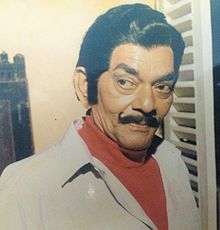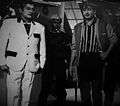Rajanala Kaleswara Rao
Rajanala Kaleswara Rao Naidu, popularly known as Rajanala, was an Indian film actor known for his works predominantly in Telugu cinema, Telugu theatre, and few Tamil, Kannada and Bollywood films. In a film career spanning more than forty years, Rajanala starred in more than four hundred feature films in a variety of characters. Regarded as one of the finest method actors, Rajanala was known for his gruesome portrayals of lead antagonist roles during the Golden age of Telugu cinema[1][2] as well as numerous comedy roles such as in Jagadeka Veeruni Katha.
Rajanala Kaleswara Rao | |
|---|---|
 Rajanala in Hello Brother (1994) | |
| Born | Rajanala Kaleswara Rao Naidu 3 January 1925 Nellore, Andhra Pradesh, India |
| Died | 21 May 1998 (aged 73) Chennai, Tamil Nadu, India |
| Other names | Rajanala Kalayya King of Villains |
| Alma mater | University of Lucknow Andhra University |
| Occupation | Actor Thespian |
| Years active | 1950-1996 |
| Known for | Tenali Ramakrishna Narthanasala Gundamma Katha Dakshayagnam Chitti Tammudu Gulebakavali Katha Shri Krishna Pandaviyam Palnati Yudham |
| Spouse(s) | R. B. Devi |
| Awards | Andhra Pradesh State Nandi Awards |
Early life and characteristics
Rajanala was born on January 3, 1925 in Nellore, Andhra Pradesh, India. While working as a revenue inspector in Nellore from 1944–51 he made his entry into theatre. A post graduate in philosophy from University of Lucknow and a voracious reader of English literature.[3][4]
Death
Being a diabetic, his right leg could not withstand the rigors of outdoor shooting in Araku valley in 1995 when he was playing a full-fledged role in Telugu Veera Levara. His leg which was injured during the shooting had to be amputated at Nizams Institute of Medical Sciences. Later Rajanala had severe cardiac arrest, was admitted in Vijaya Hospital in Chennai. He died on 21 May 1998 in Chennai.[1][5]
Selected filmography
- Pratigya (1953)
- Jayasimha (1955)
- Tenali Ramakrishna (1956)
- Suvarna Sundari (1957)
- Kutumba Gowravam (1957)
- Vinayaka Chaviti (1957)
- Raja Makutam (1959)
- Sri Venkateswara Mahatyam (1960)
- Sahasra Siracheda Apoorva Chinthamani (1960)
- Usha Parinayam (1961)
- Jagadeka Veeruni Katha (1961)
- Siri Sampadalu (1962)
- Gulebakavali Katha (1962)
- Chitti Tammudu (1962)
- Dakshayagnam (1962)
- Gundamma Katha (1962)
- Paruvu Prathishta (1963)
- Narthanasala (1963)
- Ramudu Bheemudu (1964)
- Devatha (1964)
- Bobbili Yudham (1964)
- C.I.D. (1965)
- Sri Simhachala Kshetra Mahima (1965)
- Dorikithe Dongalu (1965)
- Satya Harishchandra (1965)
- Shri Krishna Pandaviyam (1966)
- Pidugu Ramudu (1966)
- Palnati Yudham (1966)
- Sri Sri Sri Maryada Ramanna (1967)
- Shri Krishnavataram (1967)
- Ave Kallu
- Goodachari 116 (1967)
- Farz (1967)
- Apoorva Piravaigal (1967)
- Nene Monaganni (1968)
- Baghdad Gajadonga (1968)
- Varakatnam (1968)
- Bhale Tammudu (1969)
- Saptaswaralu (1969)
- Raithu Bidda
- Daana Veera Soora Karna (1977)
- Nakili Manishi (1980)
- Bobbili Puli (1982)
- Bhale Thammudu (1985)
- Number One (1994)
- Hello Brother (1994)
- Ramudochadu (1996)
Gallery



 Rajanala and Krishna
Rajanala and Krishna Rajanala Guest appearance
Rajanala Guest appearance


References
- "The original swashbuckler". The Hindu. 3 April 2009. Retrieved 15 July 2018.
- M.L. Narasimham (11 February 2016). "Rajamakutam (1960)". The Hindu. Retrieved 15 July 2018.
- M.L. Narasimham (9 July 2015). "Manchi manasuku manchi rojulu (1958)". The Hindu. Retrieved 15 July 2018.
- M.L. Narasimham (14 August 2014). "Jayasimha (1955)". The Hindu. Retrieved 15 July 2018.
- "Rajanala Kaleswara Rao Jayanthi Special - Video Dailymotion". Retrieved 15 July 2018.